- Home
- John le Carré
The Little Drummer Girl Page 19
The Little Drummer Girl Read online
Page 19
‘Seems quite a place,’ he remarked genially as he read. ‘Weapon training with dummy guns. The techniques of sabotage – using plasticine instead of the real stuff, naturally. How to live in hiding. Survival. The philosophy of the urban guerrilla. Even how to look after an unwilling guest, I see: “Restraint of unruly elements in a domestic situation”. I like that. That’s a fine euphemism.’ He glanced over the top of his cutting. ‘This correct, this report, more or less, or are we dealing with the typical exaggerations of the capitalist-Zionist press here?’
She no longer believed in his goodwill, nor did he want her to. Kurtz’s one aim now was to alarm her with the extremity of her opinions, and force her into flight from positions she did not realise she had taken. Some interrogations are conducted in order to elicit truth, others to elicit lies. Kurtz wanted lies. His grating voice had therefore discernibly hardened, and the fun was fading quickly from his face.
‘Want to give us a more objective picture, Charlie, maybe?’ Kurtz enquired.
‘It was Al’s scene, not mine,’ she said defiantly, making her first withdrawal.
‘But you went together.’
‘It was a cheap weekend in the country at a time when we were broke. That’s all.’
‘That’s all,’ Kurtz murmured, leaving her with a vast and guilty silence too heavy for her to shift single-handed.
‘It wasn’t just me and him,’ she protested. ‘It was – God – twenty of us. Kids, acting people. Some of them were still at drama school. They’d hire a bus, take some hash, play musical beds till morning. What’s wrong with that?’
Kurtz had no opinion, just then, of what was wrong with anything.
‘They,’ he said. ‘What were you doing? Driving the bus? – the great driver we hear you are?’
‘I was with Al. I told you. It was his scene, not mine.’
She had lost her hold and was falling. She scarcely knew how she had slipped, or who had stamped on her fingers. Perhaps she had just grown tired and let go. Perhaps she had wanted to all along.
‘And how often would you say you indulged yourself in this fashion, Charlie? Talking hot air. Smoking hash. Participating in free love innocently while others engaged in terrorist training? You speak as if it was a habitual thing. Correct? Habitual?’
‘No, it is not habitual! It’s over, and I did not indulge myself!’
‘Want to say how frequent?’
‘It wasn’t frequent either!’
‘How often?’
‘A couple of times. That’s all. Then I got cold feet.’
Falling and spinning, and the dark getting darker. The air all round her but not touching her.
Joseph, get me out of this! But Joseph had got her into it. She listened for him, sent messages to him with the back of her head. But she received nothing in return.
Kurtz looked straight at her and she looked straight back. She’d have looked clean through him if she could; she’d have blinded him with her defiant glower.
‘A couple of times,’ he repeated thoughtfully. ‘Right, Mike?’
Litvak glanced up from his notes. ‘A couple,’ he echoed.
‘Want to say why you got cold feet?’ Kurtz asked.
Without allowing his gaze to leave her face, he reached for Litvak’s folder.
‘It was a rough scene,’ she said, dropping her voice for effect.
‘It sounds it,’ said Kurtz, opening the folder.
‘I don’t mean politically. I mean the sex. It was more than I wanted to handle. Don’t be so obtuse.’
Kurtz licked his thumb and turned a page; he licked his thumb and turned another page; he muttered something to Litvak, who breathed a couple of words in return, and they were not in English. He closed the buff folder and slipped it into the briefcase. ‘“A couple of times. That’s all. Then I got cold feet,”’ he intoned thoughtfully. ‘Want to revise that statement at all?’
‘Why should I?’
‘“A couple of times.” That correct?’
‘Why shouldn’t it be?’
‘A couple is two. Right?’
Above her, the light wavered, or was it her mind? She turned deliberately in her chair. Joseph was bowed over his desk lamp, too busy even to look up. She turned back and found Kurtz still waiting.
‘Two or three,’ she said. ‘What the hell?’
‘Four? Is a couple four as well?’
‘Oh, get lost!’
‘I guess it’s a matter of linguistics. “I visited my aunt a couple of times last year.” Well, that could be three, couldn’t it? Four is possible. Five, I guess five is around the limit. With five it’s “half a dozen”.’ He continued slowly shuffling through his papers. ‘Want to revise “couple”, make it “half a dozen”, Charlie?’
‘I said a couple and I mean a couple.’
‘Two?’
‘Yes, two!’
‘Two then. “Yes, I have been to this forum on two occasions only. Others may have engaged in warlike practices but my interests were sexual, recreational, and social. Amen.” Signed Charlie. Want to put a date on the two visits?’
She gave a date last year, soon after she and Al had got together.
‘And the other one?’
‘I forget. What does it matter?’
‘She forgets.’ His voice had slowed almost to a halt, yet lost none of its power. She had an image of it lumbering towards her like an ungainly animal. ‘Did the second time come soon after the first time, or was there a gap between the two occasions?’
‘I don’t know.’
‘She doesn’t know. Your first weekend was an introductory course for novices. Correct?’
‘Yes.’
‘What were you introduced to?’
‘I told you – group sex.’
‘No discussions, no seminars, no instruction?’
‘We had discussions, yes.’
‘On what subjects, please?’
‘Basic principles.’
‘Of what?’
‘Of radicalism, what do you think?’
‘Remember who addressed you?’
‘A spotty lesbian on Women’s Lib. A Scotsman on Cuba, someone Al admired.’
‘And the next occasion – date forgotten, the second and last – who addressed you that time?’
No answer.
‘Forgotten that as well?’
‘Yes!’
‘That’s unusual, isn’t it? That you remember the first occasion intimately – the sex, the topics of discussion, the tutors. And the second not at all?’
‘After staying up all night answering your crazy questions – no, it’s not!’
‘Where are you going?’ Kurtz asked. ‘You want the bathroom? Rachel, take Charlie to the bathroom. Rose.’
She was standing. From the shadows she heard soft feet approaching her.
‘I’m leaving. Exercising my options. I want out. Now.’
‘Your options will be exercised at specific stages, and only when we invite you. If you forget who addressed you at this second seminar you attended, then perhaps you will tell me at least the nature of the course.’
She was still standing, and somehow being upright made her smaller. She glanced round and saw Joseph, head in hand, his face turned away from the lamplight. To her frightened eye, he seemed to be suspended in a kind of middle city, between her world and his. But wherever she looked, Kurtz’s voice kept filling her head and deafening the people inside it. She put her hands on the table, she leaned forward; she was in a strange church without friends to advise her, not knowing whether to stand or kneel. But Kurtz’s voice was everywhere and it wouldn’t have mattered whether she had lain on the ground or flown out through the stained-glass window and a hundred miles away, nowhere was safe from its dinning intrusion. She took her hands off the table and put them behind her back, holding them tight because she was losing control of her gestures. Hands matter, hands speak. Hands act. She felt them comfort each other like terrified children. Kurtz was ask
ing her about a resolution.
‘Did you not sign it, Charlie?’
‘I don’t know!’
‘But, Charlie, there is always a resolution passed at the termination of a session. There is discussion. There is a resolution. What was the resolution? You trying seriously to tell me you don’t know what it was, you don’t know whether you signed it even? Might you have refused to sign it?’
‘No.’
‘Charlie, be reasonable. How can a person of your much underrated intelligence forget such a thing as a formal resolution at the end of a three-day seminar? A thing which you draft and redraft – and vote about – and pass and don’t pass – sign and don’t sign? How do you do that? A resolution, that’s a whole laborious series of incidents, for goodness’ sake. Why are you so vague suddenly, when you are capable of such fine precision on other matters?’
She didn’t care. She cared so damn little she couldn’t be bothered to tell him she didn’t care. She was tired to death. She wanted to sit again but she was stuck standing. She wanted an interval and a pee and time to fix her make-up, and five years’ sleep. Nothing but a leftover sense of theatrical proprieties told her she must stand and see it through.
Below her, Kurtz had dug himself out a fresh piece of paper from the briefcase. Having worried over it, he decided to address himself to Litvak. ‘She said two occasions, right?’
‘Two was maximum,’ Litvak agreed. ‘You gave her every chance to raise the bidding but she stuck at two.’
‘And what do we make it?’
‘Five.’
‘So where does she get two from?’
‘She’s understating,’ Litvak explained, contriving to look even more disappointed than his companion. ‘She’s understating by like two hundred per cent.’
‘Then she’s lying,’ said Kurtz, slow to accept the inference.
‘She sure is,’ said Litvak.
‘I didn’t lie! I forgot! It was Al! I went for Al’s sake, that’s all!’
Among the gunmetal pens in the top pocket of his bushjacket, Kurtz kept a khaki handkerchief. Taking it out, he now passed it in an odd dusting motion over his face, ending with his mouth. Then he put it back in his pocket. Then he moved his watch again, from left to right in a private piece of ritual.
‘You want to sit down?’
‘No.’
Her refusal only saddened him. ‘Charlie, I have ceased to understand you. My confidence in you is ebbing.’
‘Then it can bloody well ebb! Find someone else to kick around! Why should I play parlour games with a bunch of Israeli thugs? Go and car-bomb some more Arabs. Get out of my hair. I hate you! All of you!’
Saying this, Charlie had a most curious intimation. She decided that they were only half listening to her words, and with the other half of their attention studying her technique. If somebody had called out, ‘Let’s take that one again, Charlie, maybe a little slower,’ she would not have been a bit surprised. But Kurtz meanwhile had his point to make, and nothing on his Jewish God’s earth – as she by now well knew – was going to stop him.
‘Charlie, I do not understand your evasion,’ he insisted. His voice was recovering its pace. Its power was undiminished. ‘I do not understand the discrepancies between the Charlie you are giving us and the Charlie we have on record. Your first visit to this revolutionary school took place on July fifteenth last year, a two-day course for novices on the general subject of colonialism and revolution, and yes, you all went by bus, a group of acting people, Alastair included. Your second visit took place a month later, also with Alastair, on which occasion you and your fellow students were addressed by a so-called Bolivian exile who declined to give his name, also by a similarly anonymous gentleman claiming to speak for the provisional wing of the Irish Republican Army. You generously signed both of those organisations a personal cheque for five pounds, and we have photocopies of the cheques right here.’
‘It was for Al! He was broke!’
‘The third time you went was a month later, when you took part in a very pathetic discussion on the work of the American thinker Thoreau. The group’s verdict on that occasion, to which you subscribed, was that when it came to militancy, Thoreau was an irrelevant idealist with little practical understanding of activism – in short, a bum. You not only supported that verdict but initiated a supplementary resolution calling for greater radicalism on the part of all comrades.’
‘It was for Al! I wanted them to accept me! I wanted to please Al! I’d forgotten it next day!’
‘Come October, you and Alastair were back there, this time for a particularly apposite session on the subject of bourgeois Fascism in Western capitalist societies, at which you played a leading rôle in group discussions, regaling your comrades with many mythical anecdotes regarding your criminal father, your inane mother, and your repressive upbringing generally.’
She had stopped protesting. She had stopped thinking or seeing. She had blurred her gaze and taken a piece of the inside flesh of her mouth between her teeth and she was softly biting it as a punishment. But she couldn’t stop listening, because Marty’s voice didn’t allow that.
‘And the very last occasion occurred, as Mike here reminded us, in February this year, when you and Alastair graced a session whose theme you have obstinately dismissed from your memory, except just a moment previously when you lapsed into abuse of the State of Israel. This time the discussion was devoted exclusively to the lamentable expansion of world Zionism and its links with American imperialism. The leading performer was a gentleman purportedly representing the Palestinian revolution, though he declined to say which wing of that great movement he belonged to. He also refused in the most literal sense to reveal himself, since his features were hidden behind a black balaclava helmet, which gave him a becomingly sinister air. Do you still not recall this speaker?’ He left her no time to answer. ‘His theme was his own heroic life as a great warrior and killer of Zionists. “The gun is my passport to my homeland,” he declared. “We are no longer refugees! We are a revolutionary people!” He caused a certain alarm around him and one or two voices, not your own, felt he had gone a little far.’ He paused, but still she did not speak. He moved his watch closer to him and smiled at her a little wanly. ‘Why don’t you tell us these things, Charlie? Why do you flop from place to place not knowing which lie to tell us next? Did I not assure you that we need your past? That we like it very much?’
Again he waited patiently for her answer, but in vain. ‘We know your father never went to prison. You never had the bailiffs in, nobody took your pony from you. The poor gentleman suffered a small, incompetent bankruptcy, injuring nobody except a couple of local bank managers. He was discharged with honour, if that is the expression, long before his death; a few friends raised a little money between them, and your mother remained a proud and devoted wife to him. It was never your father’s fault that you left school prematurely, it was your own. You had made yourself, let us say, a little too available to several boys in the local town, and word of this had duly gotten back to the school staff. You were accordingly expelled from the school in haste as a corrupting and potentially scandalous element, and returned to your grossly overindulgent parents, who as usual forgave you your transgressions, to your great frustration, and did their best to believe everything you told them. Over the years you have spun an ingenious fiction around the incident in order to make it bearable, and you have come to believe in it yourself, though secretly the memory still turns you inside out and drives you in many strange directions.’ Yet again, he transferred his watch to a safer spot on the table. ‘We’re your friends, Charlie. Do you think we would ever blame you for such a thing? Do you think we do not understand that your politics are the externalisation of a search for dimensions and responses not supplied to you when you most needed them? We’re your friends, Charlie. We’re not mediocre, bored, apathetic, suburban, conformist. We want to share with you, to make use of you. Why do you sit there deceiving us when all we wish t
o hear from you, from start to end, is the unadorned objective truth? Why do you hinder your friends, instead of giving us your full-hearted trust?’
Her anger swept over her like a red-hot sea. It lifted her, it cleansed her; she felt it swell and she embraced it like her one true ally. With the calculation of her trade, she let it take command of her entirely, while she herself, that tiny gyroscopic creature deep inside that always managed to stay upright, tiptoed gratefully to the wings to watch. Anger suspended her bewilderment and dulled the pain of her disgrace; anger cleared her mind and made her vision brilliant. Taking a step forward, she lifted her fist to swipe at him, but he was too senior, too daunting, he had been hit too much before. Besides, she had unfinished business just behind her.
True, it was Kurtz who by his deliberate enticement of her had struck the match that kindled her explosion. But it was Joseph’s cunning, Joseph’s courtship, and Joseph’s cryptic silence that had brought about her real humiliation. She swung round, she took two strides to him, waiting for someone to stop her, but someone didn’t. She swung her foot up and kicked away the table and watched the desk lamp curve gracefully to God knew where before it reached the limit of its flex and went out with a surprised pop. She drew back her fist, waiting for him to defend himself. He didn’t, so she lunged at him where he sat, catching him across the cheekbone with all her strength. She was screaming all her filthy epithets at him, the ones she used on Long Al and the whole blank, painful nothingness of her tangled, too-small life, but she wished he would put up an arm or hit her back. She hit him a second time with her other hand, wanting to mark and hurt the whole of him. Again she waited for him to defend himself, but his familiar brown eyes continued to watch her as steadily as shore lights in a storm. She hit him again with her half-closed fist and felt her knuckles wrench, but she saw the blood running down his chin. She was screaming ‘Fascist bastard!’ and she went on repeating it, feeling her strength wasting with her breath. She saw Raoul, the flaxen hippy boy, standing in the doorway, and one of the girls – South African Rose – position herself before the French windows and spread her arms in case Charlie made a leap for the verandah, and she wished terribly that she could go mad so that everyone would be sorry for her; she wished she was just a raving lunatic waiting to be let off, not a stupid little fool of a radical actress who made up feeble versions of herself as she went along, who had denied her father and mother and embraced a half-cock faith she hadn’t the courage to renounce, and anyway, what was there till now to replace it? She heard Kurtz’s voice in English ordering everyone to stay still. She saw Joseph turn away; she saw him draw a handkerchief from his pocket and dab his lip, as indifferent to her as he might have been to a rude child of five. She screamed ‘Bastard!’ at him again, she hit him on the side of the head, a big openfisted clattering blow that bent her wrist and momentarily numbed her hand, but by now she was exhausted and alone and all she wanted was for Joseph to hit her back.

 The Honorable Schoolboy
The Honorable Schoolboy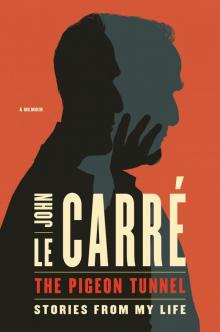 The Pigeon Tunnel: Stories From My Life
The Pigeon Tunnel: Stories From My Life Single & Single
Single & Single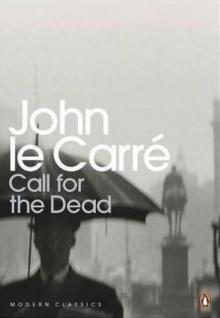 The Spy Who Came in From the Cold
The Spy Who Came in From the Cold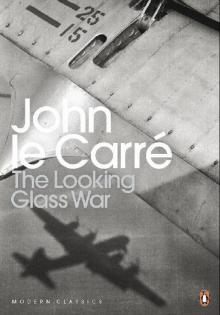 The Looking Glass War
The Looking Glass War The Night Manager
The Night Manager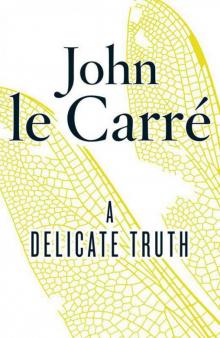 A Delicate Truth
A Delicate Truth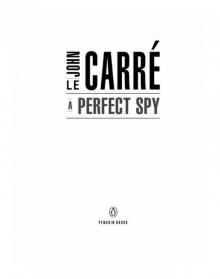 A Perfect Spy
A Perfect Spy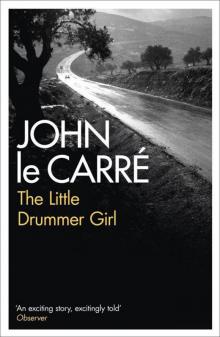 The Little Drummer Girl
The Little Drummer Girl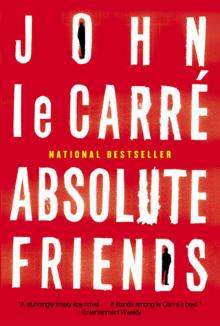 Absolute Friends
Absolute Friends A Murder of Quality AND Call for the Dead
A Murder of Quality AND Call for the Dead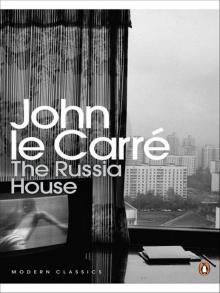 The Russia House
The Russia House The Tailor of Panama
The Tailor of Panama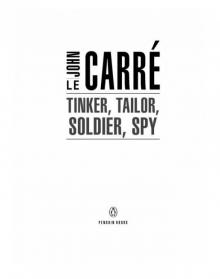 Tinker, Tailor, Soldier, Spy
Tinker, Tailor, Soldier, Spy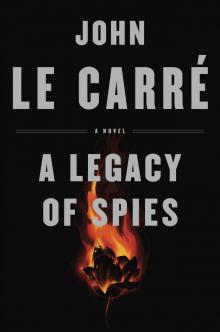 A Legacy of Spies
A Legacy of Spies The Mission Song
The Mission Song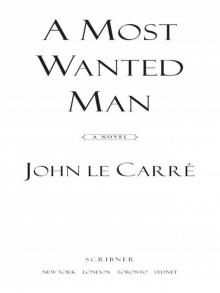 A Most Wanted Man
A Most Wanted Man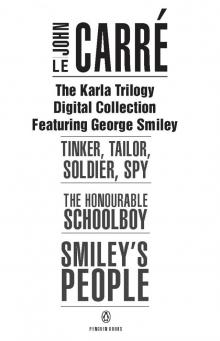 John Le Carré: Three Complete Novels
John Le Carré: Three Complete Novels The Secret Pilgrim
The Secret Pilgrim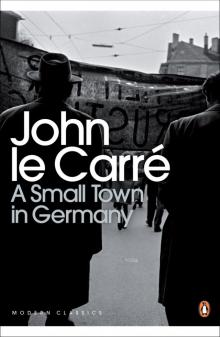 A Small Town in Germany
A Small Town in Germany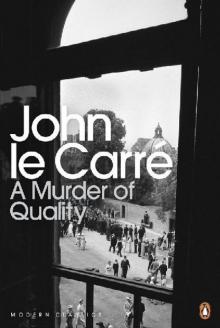 A Murder of Quality
A Murder of Quality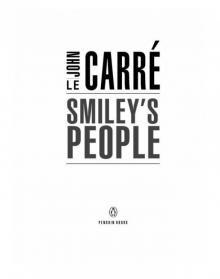 Smiley's People
Smiley's People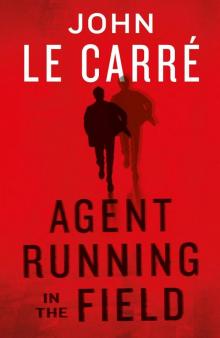 Agent Running in the Field
Agent Running in the Field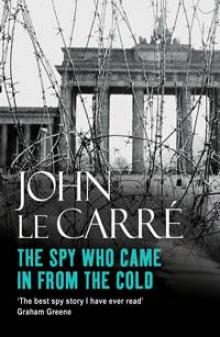 The Spy Who Came in from the Cold s-3
The Spy Who Came in from the Cold s-3 The Pigeon Tunnel
The Pigeon Tunnel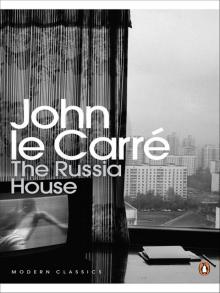 The Russia House - 13
The Russia House - 13 The Honourable Schoolboy
The Honourable Schoolboy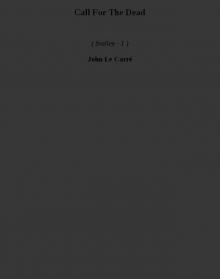 Call For The Dead s-1
Call For The Dead s-1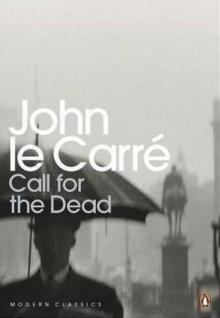 Call for the Dead
Call for the Dead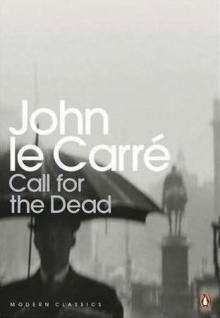 Call for the Dead - 1
Call for the Dead - 1